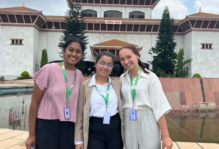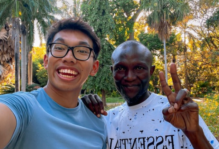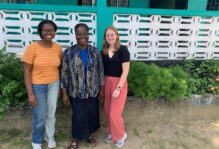From Russian Immigrants to Georgian Generals
By Ian Matthews ’25
The Global Research Institute’s Summer Fellows Program provides international experiential learning opportunities to W&M students. This post is one installment of a series highlighting the 2023 Fellows’ key discoveries and formative experiences.
My work with Professor Maliniak started the summer after my freshman year. I conducted research stateside contextualizing the interviews that Summer Fellows helped conduct in Georgia last year. That content covered Georgian veterans’ thoughts on engagement with the West and reflections on service in Iraq and Afghanistan. This past spring, I was excited to learn that I would have the opportunity to travel to Tbilisi and continue the work done last year on the ground. My experience as a GRI Summer Fellow was absolutely unforgettable, and I was able to meet people from all walks of life — from Russian immigrants to Georgian generals.
Despite researching Georgia for around a year prior to my visit, most of what I knew was from a political perspective. I had only seen bird’s eye pictures of Tbilisi and had heard little about Georgian culture. After landing in Tbilisi, I fought through the jetlag and had an incredibly eventful day. I had breakfast with my Professor and our military expert, Chuck. Chuck served in Afghanistan as an Army Ranger sniper and carries a vast amount of military knowledge from his time in the service. We meandered about the city. The mountainous landscape surrounds a mix of classical and brutalist architecture. Later that day, we met up with our fellow researcher, Lumin, and trekked to Vake Park to meet with a Georgian colonel over a feast of desert. Much of our time spent in Georgia was filled with similar adventures, riddled with fast turnarounds and fascinating experiences.

Mount Shani overlooking Gergeti.
In Georgia, we Summer Fellows had three main projects: interning at the Georgian Strategic Analysis Center (GSAC), interviewing Georgian veterans and state officials about the Georgian Defense Force’s participation in the War on Terror, and conducting video interviews with Russian immigrants about their escape to Georgia. Interning at GSAC mainly involved writing grant proposals and conducting open-source research. They were an invaluable resource when meeting contacts in the Georgian government. They also hosted an integration program for Russian immigrants, which helped the expats learn about Georgian language, politics, and history. However, our interviews started later in our stay compared to the team last year, so by the time that we started interviewing Georgian veterans, we had no US veterans left in Georgia.
I was worried that my lack of military experience and knowledge of military standard operating procedures would hinder my ability to understand those I was speaking to. Fortunately, based on context, I was able to quickly learn the structure of the Georgian military. With the Russian video interviews, I was worried that I would not be able to understand our interviewees well, as I was only in my second year of Russian at the time. Fortunately, Kathryn, another GRI summer fellow, had far better Russian skills than I and conducted the interviews while I worked the camera. Even though I was not speaking to the Russians directly during their interviews, I was able to understand most of what they said. Also, speaking to them after the interviews greatly improved my language skills.
In both of the interview projects, I was always surprised by how much the people we were interviewing were willing to disclose. They were almost always excited to talk about their experiences. In 2008, Russia invaded Georgia and started occupying the Tskhinvali region (South Ossetia). This caused sentiment towards Russian immigrants to be rather negative. Despite graffiti around Tbilisi saying “Russians go home!” or “Put Russians here!” plastered on trash cans, most of the Russians we interviewed seemed to enjoy Georgia. This does not mean their journey was without hardship — we heard stories of people leaving without telling their parents to accounts of some attempting to cross the border on foot with only a loaf of bread, a telephone, and a pack of cigarettes. Despite many of these stories being difficult to discuss, the people we were interviewing were more than happy to talk.

(Left to Right) Lumin, Me, and Kathryn in front of a waterfall in the Adjara Mountains. (Photo Credit: Julia Norsworthy-Edghill).
The Georgian veterans and state officials were also very eager to share their stories. Our results showed that most people subscribed to at least one of the following reasons as to why Georgians fought in Iraq and Afghanistan. The first is the salary increase — some said that the salary for one tour in Afghanistan could pay for a house in Georgia. The second was to gain experience — some who held this view only prescribed it to officers and not standard infantry. Lastly, the big picture reason was that Georgia wanted to get into NATO and hoped to accomplish that by showing they were a professional military in the field. At the end of my stay in Georgia, I discovered a very interesting finding that puts all of our research in a new light. When interviewing a veteran, I asked him the same question I asked all veterans: “Why did you decide to serve in Afghanistan?” He said he did not choose, but he was assigned. Those who did not “choose” to go to Afghanistan were released from the army. Still, many young men signed up for the Georgian Defense Forces during this time with the aspirations of serving in Afghanistan or Iraq.
The beauty of the country of Georgia is absolutely remarkable. I spent most of my weekends exploring different regions. The region of Adjara held the coastal town of Batumi and the Adjaran mountains. The mountains were riddled with natural springs and waterfalls. With water being so abundant, the forests in Adjara were lush and verdant. Kakheti, the wine-making region, was filled with old monasteries, convents, and vineyards with the mountains looming in the distance. Kazbegi is located mere miles from the Russian border, which is delineated by the northern Caucasus and has some of the largest mountains west of the Himalayas. Borjomi, the town that produces the famous spring water of the same name, has architecture akin to a town in a fairytale.

The hospitality of the people of Georgia should not be understated. Despite not knowing their language, we were welcomed with open arms. The Russians we met were also very kind; they bought us food and invited us into their homes, and I would call many of them friends. With the unforgettable stories we gathered in Georgia, I look forward to seeing where our research will go. I will always look back fondly on my time in Georgia, and I hope to return sometime in the near future. For now, I am working with the International and Political Affairs in the Caucasus (IPAC) research lab compiling the results from our interviews into summaries to later be turned into an academic paper.




No comments.